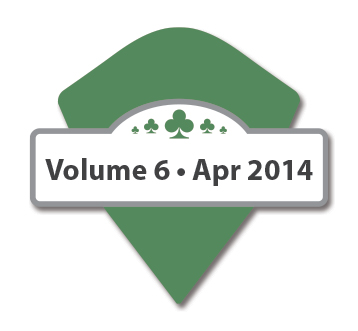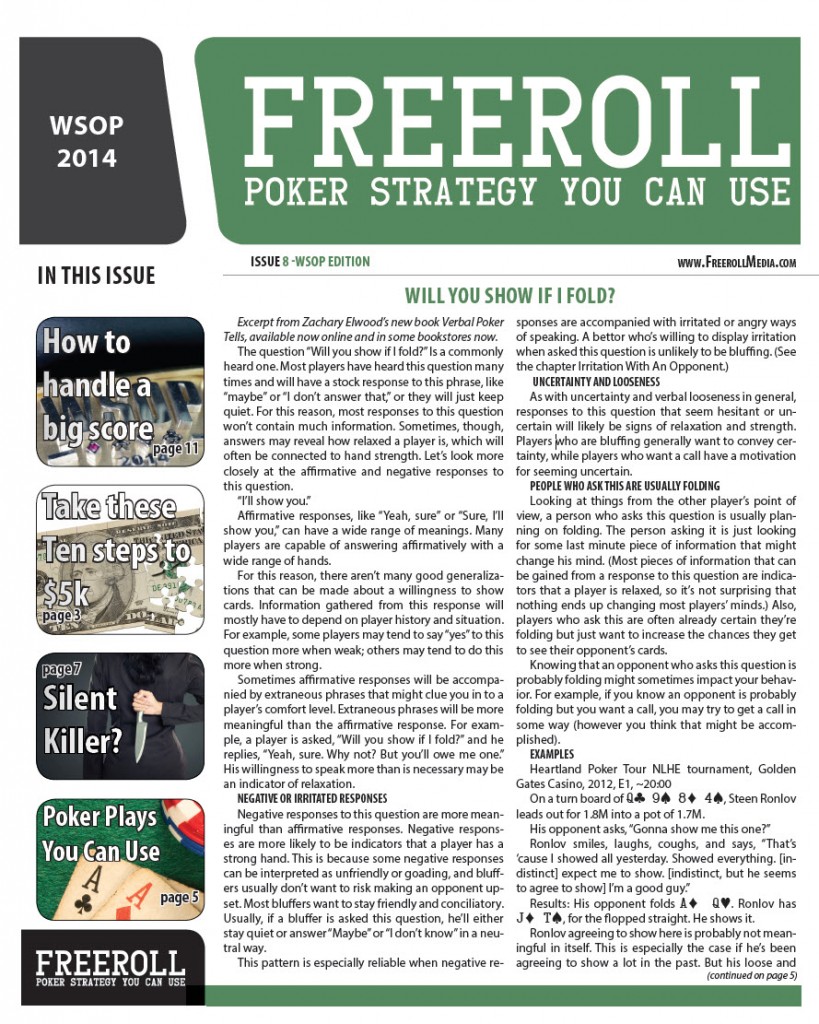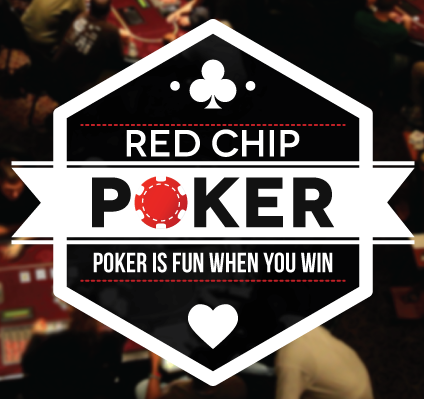Tells: Immediate Verbal Responses
- By Zach Elwood
- April 20, 2014
- Comments Off on Tells: Immediate Verbal Responses
 Players who have made a significant bet and who make immediate verbal responses are more likely to have strong hands.
Players who have made a significant bet and who make immediate verbal responses are more likely to have strong hands.
One sign of relaxed speech is that it flows freely, without hesitation. Anxious people are more likely to think for a moment before speaking because they have a reason to be concerned with how their speech will be interpreted. For this reason, a player who has made a significant bet and responds im¬¬mediately to a question or statement is more likely to be relaxed and have a strong hand.
The more complex and potentially meaningful a verbal response is, the more an immediate response points to relaxation. Smaller and simpler responses, when said immediately, are not as meaningful as when more complex responses are said immediately. For example, a player goes all-in on the river and is asked, “Do you want a call?” He responds immediately, “Maybe.”
Because this is an ambiguous response that doesn’t contain much information, the immediacy of response in this case isn’t very meaningful.
For comparison, let’s suppose the bettor had answered immediately: “I definitely want a call.” Because this statement contains a more complex idea and could theoretically contain information about the speaker’s hand strength, it is unlikely that a bluffer would make such a statement without first considering what the repercussions would be. If the player had paused a second or two before responding “I definitely want a call”, this response would be less meaningful because the player would have had time to consider whether saying such a thing was a good strategy.
An immediate response is more likely to indicate relaxation the more times it is exhibited. One immediate response isn’t as meaningful as several quick verbal responses in a row, as sometimes happens in a back-and-forth conversation.
Here are a few examples from some poker hands (both televised and hands I’ve observed):
$2-5 NLHE cash game,
witnessed by author
On a turn board of 8♣ 9♠ 5♥ T♦, the aggressor bets $60 into a pot of $90.
His opponent asks, “Are you bluffing?”
The bettor immediately nods his head, answering in the affirmative.
Results: The bettor has TJo, for top pair and a straight draw.
The immediacy of response is probably just as relevant as the content of this communication. (As we know, players betting weak hands are unlikely to imply they are weak.)
$2-5 NLHE cash game,
witnessed by author
(This hand previously discussed.) On a river board of 6♣ T♥ 4♥ 4♣ A♦, a player has 66 for the full house. She bets $100 into a pot of $200.
Her opponent asks her, “You have a full house?”
She immediately replies, “No.”
The immediacy of this player’s response makes it unlikely she’s bluffing.
$1-2 NLHE cash game,
witnessed by author
It’s a heads-up hand. The turn board is Q♥ T♠ 6♠ 5♠. The
aggressor goes all-in for $80 into a pot of $130.
After a few moments, his opponent asks, “You got pocket kings with the king of spades?”
The bettor says immediately, “Be a pretty good guess.”
Results: The bettor’s opponent folds. The bettor shows his KK, with the king of spades.
His opponent’s length of time in considering the bet probably put the bettor at ease that his hand was best. His immediate response was likely a result of two things: him being relaxed enough to immediately respond, and his being impressed with the accurate guess.
2009 WSOP NLHE
Main Event tournament
Andy Black raises pre-flop to 24,000. Scott Buller goes all-in, which would be 143,000 more for Black to call.
Black: “Would you like me to call, sir?”
Buller (quickly): “You know, it doesn’t really matter.”
Black: “It doesn’t matter cause it’s late in the tournament or it doesn’t matter because-”
Buller (cutting him off): “No. No. We’re just getting started.” Buller smiles.
Black: “On a scale of one to ten, how would you rate your hand?”
Buller shakes his head dismissively to that question.
Black laughs, looking at Buller for some sort of reaction. “I’ve got a big hand here, you know?…Give me something.”
Buller is quiet.
Results: Black calls with AJo. Buller has AKo.
Buller’s immediate responses and his willingness to cut Black off mid-sentence are strong indicators of relaxation.

2005 WSOP NLHE
Main Event tournament
Tiffany Williamson 3-bets pre-flop to 290,000. Greg Raymer 4-bets all-in to 1.3M and the action returns to Williamson.
Williamson: “How much?”
Raymer (immediately): “One-point-three million exactly.”
Williamson: “Could you count it, please?”
They get a count.
Williamson: “One-point-three? Altogether?”
Raymer (seeming frustrated): “Yes. Altogether I only have one-point-three.”
Williamson: “What a story this would be.”
Raymer (immediately): “Which way?”
Results: Williamson calls with AJo. Raymer has KK.
Raymer’s immediate responses to Williamson would seem to indicate relaxation. (His willingness to show impatience and frustration also makes it more likely he has a strong hand.)
High Stakes Poker, high stakes NLHE cash game, S2 E8, ~3:00
(This hand previously discussed.) Brad Booth has 8♦ 9♦ on a river board of T♦ J♦ 4♣ Q♦ 8♥. Negreanu bets $16,000. Booth raises $30,000 more.
Negreanu says, “I thought you might have had the flush. I had the straight.”
Booth replies immediately, “I got a straight flush.”
Booth’s immediate response is a strong indicator of his relaxation. If he were bluffing, he would be likely to consider for at least a second how such a statement might impact his opponent’s decision.
The immediacy of Booth’s response doesn’t mean he’s necessarily telling the truth; it is just a general indicator of relaxation and makes a bluff unlikely.
Elwood’s work-in-progress, Verbal Poker Tells, will be published by May 2014.


